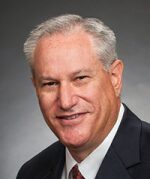SPE has served members through the ebbs and flows of the oil and gas industry since 1957. The exploration and production business is inherently cyclical. Our current E&P industry downturn is a result of our industry’s relentless effort to find new oil and natural gas resources and develop the technology to unlock these resources from challenging reservoirs.
Through every industry cycle, SPE is steady and supportive. I know this to be true because I was a member long before I became the CEO. When the industry experiences a downturn, companies react. That can result in layoffs, budgets tightening, mergers and acquisitions ramping up, and similar responses. All that sounds logical, but when you are the one caught in the cross fire, the obstacles can seem insurmountable.
I know that all too well since I found myself in that dilemma in 1987 when I was unemployed during an industry downturn. At a time when petroleum engineering job openings were scarce, I turned to the contacts I gained as an SPE member. I attended the SPE Annual Technical Conference and Exhibition (ATCE), networked with fellow colleagues, and was able to find another opportunity through these contacts. I appreciated my membership in SPE and viewed its benefits as tangible and valuable then.
Years later, now as SPE’s CEO, I strive to assure the commitment the Society has to serve its members in broad and specific ways.
SPE exists to serve you, our members, throughout your career. We are here for you whether you are a seasoned engineer, a young professional, or a student member. As the industry reacts, we want you to know that your Society is proactive with resources and programs to serve your needs.
At times like these, there are a few specific things you should know about:
- SPE is launching a new job board that will include jobs in the oil and gas industry that may be of interest to members who are out of work.
- Members can request a dues waiver if unemployed or for other financial hardship reasons.
- SPE offers health insurance for members, including a private health exchange for US members.
- Members who are out of work will receive a free one-day registration to attend the exhibition and special programs designed for them during the last day of ATCE in Houston in September.
- SPE offers approximately 100 free webinars annually for members on topics that help them improve their skills.
- E-mentoring programs are available for young professionals who have not experienced a downturn previously.
- PetroWiki is an ideal way for retired or unemployed members to stay engaged and demonstrate their expertise.
- SPE offers a free, online competency management tool for members to assess their current professional capabilities utilizing 22 key E&P job competency models covering geosciences, reservoir engineering, well engineering, production engineering and operations, project and facilities engineering, and HSE. Members will be able to use the self-assessment results to generate an individual development plan to address competency gaps. Access to a tailored development plan can serve as an ongoing resource for members who want to keep their skills current and credentials consistent with prevailing standards.
Rig counts may decline, but the demand for innovation in oil and gas E&P is increasing. As the industry constricts, SPE is here for our members, providing services and resources efficiently and effectively. The risks and rewards of a career in energy may be unpredictable at times, but know that you can always count on SPE. If you have additional ideas about ways SPE can help our members during the downturn, send me an email at ceo@spe.org.

Mark Rubin is chief executive officer and executive vice president of SPE, responsible for overall management of SPE. He works with the Board of Directors and senior staff to develop strategic and business plans and formulate the organization’s goals, objectives, policies, and programs, and also organizes and directs the global staff organization. He was appointed executive director of SPE in August 2001. Previously, he was upstream general manager for the American Petroleum Institute in Washington, DC. An SPE member since 1979, Rubin held petroleum engineering positions for Unocal in Houston and east Texas from 1981 to 1987 and for Buttes Resources in Dallas from 1987 to 1988. He earned a BS degree in petroleum engineering from Texas A&M University and an MBA from Southern Methodist University.
